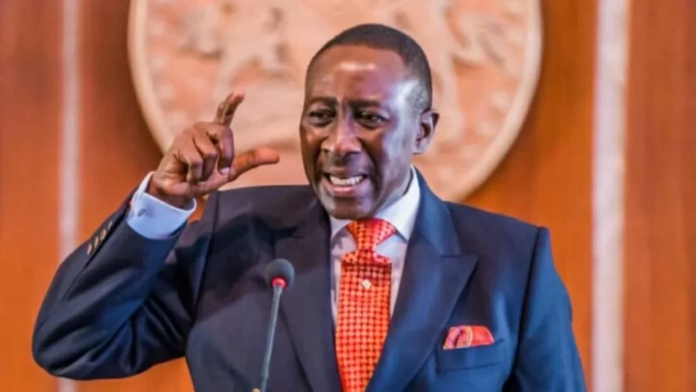The National Security Adviser (NSA), Babagana Monguno, has said the federal government prevented over three million barrels of crude oil from being stolen between August 2018 and January 2023.
Mr Monguno said the crime was perpetrated within Nigeria’s Exclusive Economic Zone (EEZ) up to the Republic of Togo.
He said this at the Stakeholders’ Conference on Oil Theft and Losses in Nigeria, convened by the Special Investigative Panel on Oil Theft/Losses in Nigeria on Tuesday in Abuja.
Mr Monguno, a retired major general, said security agencies have embarked on a series of intelligence-driven maritime security and are using the “Falcon Eye System” a high-tech real-time intelligence Maritime Domain Awareness facility that is coordinated with the NSA.
According to him, the facilities and initiatives have facilitated the prosecution of over 200 vessels involved in maritime criminality and the recovery of about 11 million litres of petrol and diesel within five years.
“I have also directed that the Falcon Eye System – a high tech real-time intelligence Maritime Domain Awareness facility domiciled with the Nigerian Navy and coordinated by the Office of the National Security Adviser be fully committed to addressing this emerging concern.
“The facility has between August 2018 and January 2023 facilitated the prosecution of over 200 vessels involved in maritime criminality within Nigeria’s Exclusive Economic Zone (EEZ) up to the Republic of Togo.
“In addition, 83 oil tankers involved in various crude oil and product theft have been arrested, while the theft of over 3 million barrels of crude oil was prevented and 11 million litres of petrol and diesel were recovered.
Crude oil theft the biggest threat to Nigeria’s economy
Mr Monguno said the attacks on oil-producing facilities have led to several shutdowns in some International Oil Companies in the country.
This, according to him, has resulted in the loss of revenue and by implication negated the capacity of the government to generate the required resources to fulfil its statutory responsibilities to the citizenry.
“Currently, crude oil theft is arguably the biggest threat to Nigeria’s economy. Its socioeconomic impact includes environmental degradation, health hazards and disruption in economic activities of the host communities amongst other concerns.
Nigeria struggling to do 60 per cent of 2 million barrels of oil per day
The Minister of State, Petroleum Resources, Timipre Sylva, said the country has been unable to produce even 60 per cent of the two million barrels of oil per day it produced 30 years ago.
This, he said, was a result of the menace of oil theft and bunkering in the country.
According to him, the federal government hired private security firms in collaboration with other security organisations like Pipeline Infrastructure Nigeria Limited (PINL) and Tantita Security Nigeria to help increase oil production.
He said that since their collaboration, numerous oil theft camps and illegal bunkering sites by oil thieves have been found in various sections of the Niger Delta region.
PREMIUM TIMES had reported how Nigeria lost $10 billion to crude oil theft in seven months, and as well, uncovered an illegal four-kilometre illegal oil connection line from Forcados Terminal.
The Nigerian National Petroleum Company Limited (NNPCL) chief executive officer, Mele Kyari, said the illegal oil connection line has been in operation for nine years.
The federal government in its recent draft fiscal strategy paper for 2023 through 2025 said that oil revenue underperformed due to significant production shortfalls such as shut-ins resulting from pipeline vandalism and crude oil theft.
In a bid to curb crude theft, the Nigerian government launched an application in August to monitor incidence. The NNPC awarded a multi-billion naira pipeline surveillance procurement to a former leader of the Movement for the Emancipation of Niger Delta (MEND), Government Ekpemukpolo, aka Tompolo.In his remarks, the Interim Administrator of the Presidential Amnesty Programme (PAP,) Barry Ndiomu, called for a deliberate conversation to drive legal reforms that would provide stiffer penalties to culpable entities involved in oil theft.
Mr Ndiomu, a retired major general, who is the chairman of the Special Investigative Panel on Oil Theft/Losses, said “frank discussions” must be held to enable the country to “crack the code” and put an end to the “criminal enterprise” of oil theft.
Speaking further, he stated that the menace of oil theft has had an enormous negative impact on Nigeria’s crude oil production, plunging output to a 13-year low of 800,000bpd.
He reiterated that strategic consultations have been held with state governments of the Niger Delta region and other critical stakeholders to that effect.
Read the original article on Premium Times.




